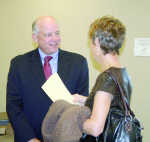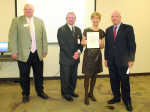Larkin highlights strengths of rural hospitals at celebration

As urban areas build more and more hospitals, it becomes more difficult for their smaller, rural counterparts to compete for the talent needed in an ever--changing healthcare environment.
However, State Health Commissioner Greg Larkin highlighted the strengths of rural hospitals over urban facilities in a Thursday speech at Putnam County Hospital.
Larkin was at PCH to celebrate the inaugural National Rural Health Day. The subject and the setting were both close to Larkin's heart, as he had a family medical practice in Greencastle from 1975-1986.

"It's really nice to come back here, not only to celebrate Rural Health Day but to return to the city I consider my adult home," Larkin said.
He even noted he was speaking on the same floor of PCH on which he had delivered his son Nick.
Larkin said 55 of Indiana's 92 counties are in non-metropolitan areas. Of these 55 rural counties, 26 are partially or completely underserved in terms of medical care.
Add to this the fact the median age of residents is increasing with the Baby Boomer generation and Putnam County's double-digit unemployment rate, and the challenges to the healthcare community are clear.
Larkin called critical access hospitals (CAHs) such as Putnam County Hospital "the backbone of rural healthcare." He also noted a number of advantages CAHs have over larger, urban care facilities.
Most of these -including long-term community improvement plans, home health services, support for community-building activities, contributions to local organizations and community outreach - relate to the ties CAHs have with their local communities.
As the only hospital in the community, the fortunes of a facility like Putnam County Hospital are closely tied to the fortunes of Greencastle and Putnam County in general.
Larkin also highlighted how CAHs are strong in the areas of health fairs, health screenings and immunizations, all of which can be other forms of community outreach.
"Critical Access Hospitals are stepping up to the plate - even with limited resources - to be part of the solution," Larkin said.
Having thanked Larkin for his involvement in the event, Putnam County Hospital CEO Dennis Weatherford noted the good fortune the county has in having ties to the state health commissioner.
"We're quite fortunate in Putnam County to have a state health commissioners who not only understands rural healthcare but advocates for those needs," Weatherford said.
